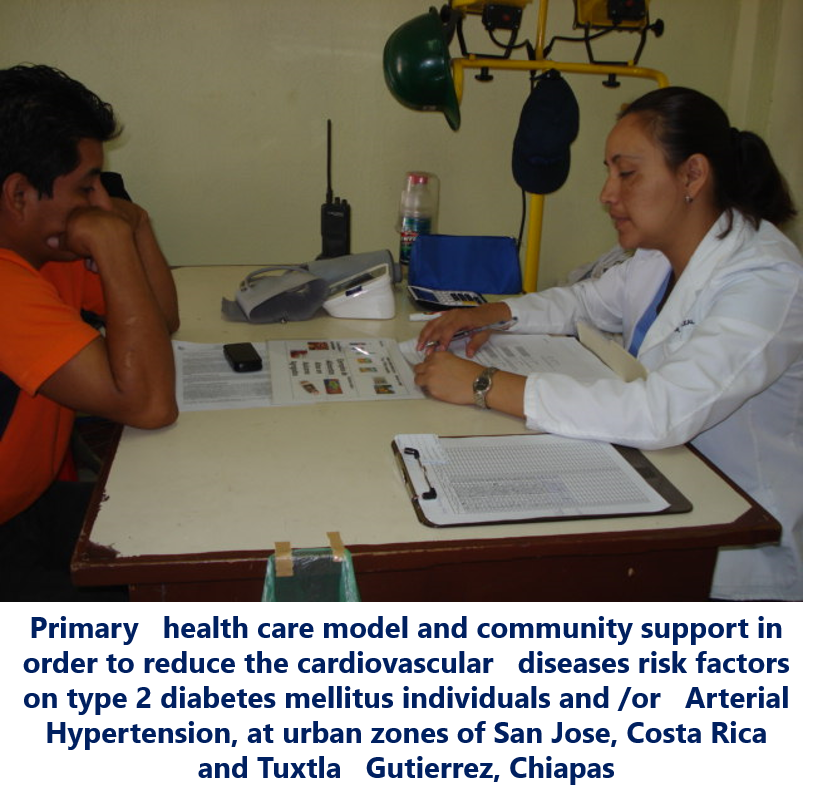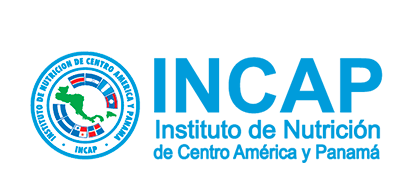
Primary health care model and community support in order to reduce the cardiovascular diseases risk factors on type 2 diabetes mellitus individuals and/or Arterial Hypertension, at urban zones of San Jose, Costa Rica and Tuxtla Gutierrez, Chiapas
|
Participating institutions |
Instituto de Nutrición de Centro
América y Panamá (INCAP) Universidad de Ciencias y Artes de
Chiapas (UNICACH) Universidad de Costa Rica (UCR) RAND Corporation.
|
|
CIIPEC Researchers |
Sandra Murillo, Ph.D, Manuel Ramírez, MD, Ph.D, Homero Martínez, MD, Ph.D. |
|
Other collaborating researchers
|
Researchers in training Ana Laura Dengo, PhD., Costa Rica Nadia Alvarado, MSc. Maricruz Castro, Chiapas Mexico Liz Arleth Peña, Chiapas Mexico |
|
Funding agency |
National Heart, Lung and Blood Institute (NHLBI) Instituto de Nutrición de Centro
América y Panamá (INCAP) |
|
General objective |
Adapt an intervention
model that can be applied at primary health care that improves
adherence to treatment and proposed changes on life style in order to
reduce the cardiovascular disease risk factors as a secondary
complication of type 2 diabetes and/or hypertension.
|
|
Methodology |
Phase 1,
formative research: This phase
focuses on identifying the capacity, resources and programs offered by
the National, state and local health system, in relation to the
attention of the CVDs, including type 2diabetes and hypertension, by the
officers and decision makers. Also, the knowledge, perceptions and
opinions about CVDs will be explored on the health services providers
(including medical and paramedical staff and people who live at the
participating communities).
Phase 2:
Adaptation and validation The clinical
attention protocols and educative materials previously developed will
be adapted and validated, in order to include the proposed model
within the system already established, and assure that the educative
materials are culturally appropriate for each one of the participating
regions in the study.
Phase 3:
Application of the proposed model: The proposed
model will be applied in order to assess its feasibility,
acceptability and effectiveness in the short term, using a
cuasi-experimental design with an intervention group and a control
group, for each one of the participating countries.
Up-to- date achievements ·
The
corresponding agreements between INCAP and the participating
Universities: Universidad de Ciencias y Artes de Chiapas (UNICACH) and
Universidad de Costa Rica (UCR) were made. ·
The research protocol has been approved by
the Institutional Review Board (IRB) of INCAP, RAND, Universidad
de Ciencias y Arte de Chiapas and Universidad de Costa Rica. ·
The research staff at each of the participating
countries has been chosen, appointed and working on the project. ·
The proposal of the project has been socialized
to the corresponding health authorities on both countries and the communities
where the project will take place have been selected. ·
The logistics for the development of phase 1 has
finished and the following activities has begun. ·
NIHLBI`s site establishment has been made. ·
The registration of the protocol at NIHLBI is ongoing.
|
















